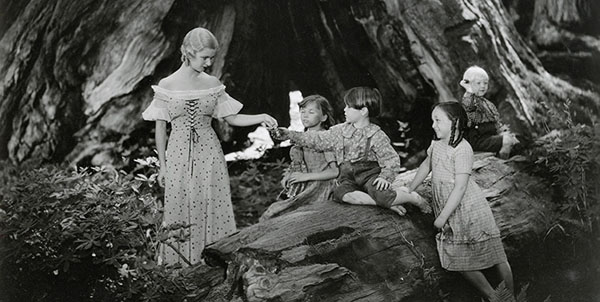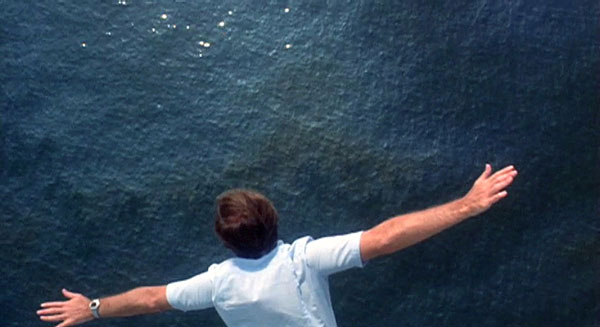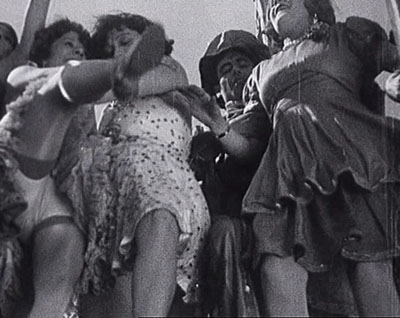New York. Watch That Man: David Bowie, Movie Star opens tomorrow and runs for a week. “Reptile, androgynous life force, alien, dissolute strumpet,” writes Melissa Anderson in the Voice: “The Film Society of Lincoln Center’s weeklong celebration of Bowie’s magnetic big-screen performances reveals how much his scripted roles grew from the alter egos he created for his recording career.” More from Ben Parker for Artforum and Mark Rabinowitz for the FSLC.
René Clair’s La Beauté du Diable (1950) opens for a week-long run at Film Forum tomorrow, and “for all of the movie’s visual gorgeousness,” writes Michael Atkinson in Time Out, “it stands as perhaps the most philosophical and most modern of all Faust films.” More from J. Hoberman at Artinfo.
The Asian American International Film Festival is on through Saturday, and Gerard Raymond has an overview at the House Next Door.
Los Angeles. Pure and Impure: The Films of Pier Paolo Pasolini, a retrospective at the UCLA Film & Television Archive, opens tomorrow, runs through August 28, and “features new prints from Istituto Luce Cinecitta in Rome,” as Susan King notes in the Times. “The series takes place in conjunction with Pasolini’s East in Roberto Villa’s Photographs, which also opens Friday at the Italian Cultural Center of Los Angeles.”
Berkeley. With A Call to Action: The Films of Raoul Walsh rolling on at the Pacific Film Archive through August 10, Dave Kehr will discuss Wild Girl (1932) tonight and introduce The Lawless Breed (1953) and Pursued (1947) on Saturday. He’s sent an email to Kelly Vance of the East Bay Express: “Raoul Walsh is one of the three great masters of American film—the others being John Ford and Allan Dwan—whose careers covered the entire range of the classical cinema, from the one-reel narratives of the nickelodeons to the color and widescreen films of the Fifties and Sixties. His style, based on deep-focus compositions and carefully matched cuts along clear lines of action, practically defines the art of making things move in the movies, and his love of adventure—fed by the kind of first-hand experience you don’t get in film school—carries both an infectious joy and a sober knowledge of the consequences of excess.”
San Francisco. In 1992, when Amy Fisher was 17, she shot her lover’s wife in the face. Mary Jo Buttafuoco survived, and “pop culture couldn’t resist sinking its fangs into this deliciously trashy tale, and three made-for-TV films quickly went into production,” Cheryl Eddy reminds us in the Bay Guardian: “Lethal Lolita — Amy Fisher: My Story, which aired Dec. 28, 1992, and starred Noelle Parker; The Amy Fisher Story, with Drew Barrymore; and Casualties of Love: The Long Island Lolita Story, with Alyssa Milano. (The latter two aired opposite each other on Jan. 3, 1993.) Two decades later, the Roxie hosts Triple Fisher: The Lethal Lolitas of Long Island, a campy, crazy-quilt film that mashes up the best (and worst) moments of all three docu-dramas.” Screens twice today. “Obviously, I had to speak to the man behind the madness: Los Angeles filmmaker Dan Kapelovitz.”
Nashville. Each weekend in August, the Belcourt will be presenting a film by Michelangelo Antonioni, beginning with L’Avventura (1960), in which “Antonioni presents an almost Buñuelian scenario in generally realistic terms,” as Michael Sicinski writes in the Scene. Then comes Blow-Up (1966), which “conflates the period’s unrest with the effete languor of Carnaby Street stick-figure vogue”; the “absolutely captivating” Zabriskie Point (1970); and The Passenger (1975), which “may be Antonioni’s most fully realized film.”
Philadelphia. The four-day BlackStar Film Festival, opening today, “is quickly becoming a hotbed of black filmmaking talent in and beyond the City of Brotherly Love,” writes Karu F. Daniels in a cover story for the Weekly. Festival founder Maori Karmael Holmes talks about the origins of the event and this year’s highlights. For Bryan Bierman, writing in the City Paper, one of them is a screening of John Sayles’s The Brother from Another Planet (1984) for which “a group of Philly-based musicians, led by producer/DJ King Britt, will create their own unique spin on a woefully underappreciated film.”
Seattle. Shintoho Schlock: Girls, Guns & Ghosts opens tomorrow and runs through August 9 at the Northwest Film Forum. “On the roster are three double features linked by common themes, including ‘Sold Into Prostitution,’ ‘Busting Out of Bars,’ and ‘Tainted Love Rises from the Dead,'” notes David Schmader in the Stranger. “Meanwhile, over at the Grand Illusion, the Seattle Erotic Art Festival presents its first-ever film showcases.”
London. Thought in Action: The Art of the Essay Film begins today with films by Jean Vigo, Maurice Pialat, Agnès Varda, and Joris Ivens—plus a talk by Kodwo Eshun. Related viewing: Kevin B. Lee‘s “thoughts of discontent” for the BFI and “Elements of the Essay Film” here in Keyframe.
“The history of the Boulting brothers is the history of British cinema in miniature,” writes Michael Newton in the Guardian. “The brilliance, the comforts and the disappointments are all there. In the 1940s, they take off from documentary realism to reach the heights of noir extravagance, before falling back into a gently unexciting worthiness. At the start of the 1950s they produce two fascinating oddities, characteristic of the oddity of the times. Later that decade, they turn to cosily satirical farce, the products of an exasperated, grump. The 1960s see them trying to get with it and making a middle-aged effort to “swing”, but also creating one work that finds a vulnerable, extraordinary beauty in ordinary lives.” The Boulting brothers season runs at the BFI Southbank from Saturday through August 30.
Berlin. The Arsenal‘s Seijun Suzuki retrospective is on throughout August.
For news and tips throughout the day every day, follow @KeyframeDaily on Twitter and/or the RSS feed. Get Keyframe Daily in your inbox by signing in at fandor.com/daily.







